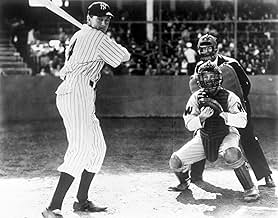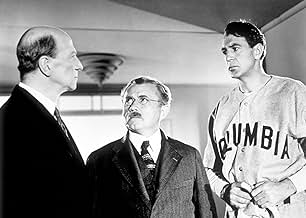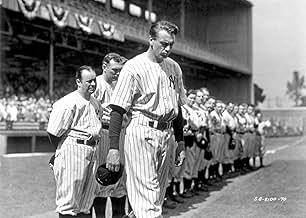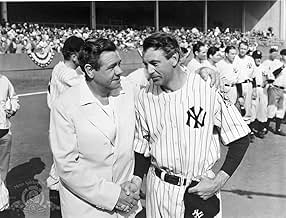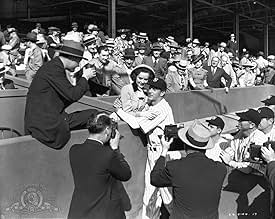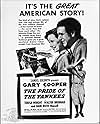AVALIAÇÃO DA IMDb
7,6/10
13 mil
SUA AVALIAÇÃO
A história da vida e da carreira do famoso jogador de beisebol Lou Gehrig.A história da vida e da carreira do famoso jogador de beisebol Lou Gehrig.A história da vida e da carreira do famoso jogador de beisebol Lou Gehrig.
- Direção
- Roteiristas
- Artistas
- Ganhou 1 Oscar
- 5 vitórias e 10 indicações no total
Ludwig Stössel
- Pop Gehrig
- (as Ludwig Stossel)
Bob Meusel
- Robert W. Meusel
- (as Robert W. Meusel)
Avaliações em destaque
It's not often that I see such a great movie where one of my heroes portrays another, but, this is certainly one of them. Gary Cooper portraying Sergeant Alvin C. York is another.
Gary Cooper does a magnificent job as Henry "Lou" Gehrig despite being two years older, for starters; and, several years older (41 playing someone in their twenties) near the beginning of the movie while at Columbia University.
Walter Brennan is brilliant as always! Teresa Wright is stunning! Besides Babe Ruth, until watching this recently on TCM, I didn't realize that other New York Yankees' teammates of Gehrig's were also in the movie as themselves - Bob Meusel; Bill Dickey; and, some others. This made the movie that-much-more enjoyable this time around! It falls into the category of movies that can be watched over and over again.
I also like the 'innocence' of a movie like this as it can be viewed by everyone in the family - from small children who love real-life heroes to the elderly who remember these heroes from real-life.
Although there are a few biographical errors about Lou Gehrig's life...overall, the movie is fantastic, even if you're not a real baseball fan! If you are a real baseball fan...this movie is a must-see!
Gary Cooper does a magnificent job as Henry "Lou" Gehrig despite being two years older, for starters; and, several years older (41 playing someone in their twenties) near the beginning of the movie while at Columbia University.
Walter Brennan is brilliant as always! Teresa Wright is stunning! Besides Babe Ruth, until watching this recently on TCM, I didn't realize that other New York Yankees' teammates of Gehrig's were also in the movie as themselves - Bob Meusel; Bill Dickey; and, some others. This made the movie that-much-more enjoyable this time around! It falls into the category of movies that can be watched over and over again.
I also like the 'innocence' of a movie like this as it can be viewed by everyone in the family - from small children who love real-life heroes to the elderly who remember these heroes from real-life.
Although there are a few biographical errors about Lou Gehrig's life...overall, the movie is fantastic, even if you're not a real baseball fan! If you are a real baseball fan...this movie is a must-see!
Gary Cooper may have won his Oscar for SERGEANT YORK--but I think he deserved it even more for PRIDE OF THE YANKEES. I've never seen him give a more heartfelt, natural and completely likeable performance than I have here. And Teresa Wright is glowing as his sweetheart.
It tells Lou Gehrig's story in a simple, straightforward manner with only an occasional bit of Hollywood corn, the kind so typical of the 1940s. But the main storyline is carried by Cooper and Wright with some great assist from Walter Brennan. Brennan drops a lot of his cornball mannerisms (the kind he uses he in all his Western roles) and plays it straight here--with excellent results.
But it's Cooper's achievement--no doubt about that. If the last twenty minutes of the film don't move you to tears, you're made of stone. Cooper gets across the panic and fear that hits him with the first signs of his illness--with a subtle show of facial expressions. He's really into his character here and gives one of the best performances of his career.
Knowing someone who died from this disease, I was especially moved at how the first signs of illness were shown here.
Douglas Croft does a fine job as the young Lou--and by the way, whatever happened to him? He played Ronald Reagan as a boy in KINGS ROW and did several other films in the '40s. And how come Dane Clark received no billing in the credits? He was only seen early on in the film but he had a line of dialogue as one of Lou's fraternity pals. He had no credit in Alan Ladd's THE GLASS KEY too--he's the man Brian Donlevy shoves through a plate glass window. A year later he was being given the star buildup at Warner Bros.
A great film and a wonderful tribute to Lou Gehrig.
It tells Lou Gehrig's story in a simple, straightforward manner with only an occasional bit of Hollywood corn, the kind so typical of the 1940s. But the main storyline is carried by Cooper and Wright with some great assist from Walter Brennan. Brennan drops a lot of his cornball mannerisms (the kind he uses he in all his Western roles) and plays it straight here--with excellent results.
But it's Cooper's achievement--no doubt about that. If the last twenty minutes of the film don't move you to tears, you're made of stone. Cooper gets across the panic and fear that hits him with the first signs of his illness--with a subtle show of facial expressions. He's really into his character here and gives one of the best performances of his career.
Knowing someone who died from this disease, I was especially moved at how the first signs of illness were shown here.
Douglas Croft does a fine job as the young Lou--and by the way, whatever happened to him? He played Ronald Reagan as a boy in KINGS ROW and did several other films in the '40s. And how come Dane Clark received no billing in the credits? He was only seen early on in the film but he had a line of dialogue as one of Lou's fraternity pals. He had no credit in Alan Ladd's THE GLASS KEY too--he's the man Brian Donlevy shoves through a plate glass window. A year later he was being given the star buildup at Warner Bros.
A great film and a wonderful tribute to Lou Gehrig.
A touching and emotional experience about the life of late-New York Yankees first baseman Lou Gehrig (played brilliantly by the always excellent Gary Cooper, Oscar-nominated). By 1939 Gehrig was saying farewell to baseball prematurely due to a rare muscle disorder that today bears the hero's name. Shortly after Gehrig's famous speech, he would indeed pass away. "The Pride of the Yankees" (made less than three years after his death) is a moving tribute that is first-class in every way imaginable. We meet the character as a young boy whose strict mother wants him to be an engineer. As the years pass though he cannot deny his love of the grand old game. Sportswriter Walter Brennan (who was always outstanding as well) becomes the biggest supporter of Gehrig, even though Gehrig seems out-of-place in the big city at times and seems more concerned about baseball than anything else (which bothers some inside of the Yankees circle, mainly due to Babe Ruth's famous antics). As the years pass, championships come and a constant is always Gehrig who set a record with 2,130 consecutive games played (Cal Ripken, Jr. would later break that record in 1995). He finds love with a young woman from Chicago (Oscar-nominee Teresa Wright) and it appears that happiness is all that the couple will experience. Sadly that would not be the case though. Sam Wood's heart-felt direction and a focused screenplay (which is a bit sappy at times) just add an odd element of grace that endears the film to most all movie-goers. Babe Ruth does play himself here and is a surprisingly excellent performer who allows himself to be taken out of the spotlight to tell Gehrig's story. He ends up being a really solid supporting actor. I do admit that "The Pride of the Yankees" is slightly flawed. Some things seem a bit staged (most notably the young child in the hospital), but overall the film is right on target. Anyone who loves baseball, loves movies and has feelings (whether good, bad or indifferent) about the Yankees should definitely give "The Pride of the Yankees" an at-bat. It is a stunning experience that is suitable for the whole family and teaches the whole audience about love, friendship, compassion, life, death and heroism. 4.5 out of 5 stars.
In today's era of greedy athletes and their employers, the story of Lou Gehrig seems almost quaint. Here's a young man who by all accounts was selfless, kind-hearted, and rather introverted. And, of course, it didn't hurt that he was also a very good baseball player too. Put him on a lineup card today and he might not be the same player. Up until a few years ago, Gehrig's record of 2,130 consecutive games played was a record, a record that many thought would stand forever. For 16 years he was in the lineup as the Yankees' first baseman, never asking out for any reason. That alone should show you how special a person Gehrig was.
This biography is pretty straightforward. Unlike many of its kind, it doesn't show its protagonist somehow succeeding against all odds. Gehrig didn't have an abusive mother, he wasn't beaten up by kids at school, he wasn't learning-disabled, he didn't have attention-deficit disorder, he didn't come from abject poverty. He was simply a son in a working-class, immigrant family, as many were during the early decades of this century. And that's why Gehrig is so special to so many people - he symbolises their own hopes.
Gary Cooper is aces as Gehrig, and Teresa Wright is wonderful as his wife, Eleanor. If there's anything imperfect about the movie, it's that it is...well, a little predictable. That's something biopics can't avoid, of course, so it's no big problem. But even if most of the film doesn't impress you, the final speech at Yankee Stadium - when Gehrig was suffering visibly from the disease that would eventually be named after him - will move you past tears. And even better, when Gehrig's done his brief speech, he walks offscreen. If that movie were written today, he'd play another game and hit a game-winning home run. It's this film's honesty and sincerity that win you over.
This biography is pretty straightforward. Unlike many of its kind, it doesn't show its protagonist somehow succeeding against all odds. Gehrig didn't have an abusive mother, he wasn't beaten up by kids at school, he wasn't learning-disabled, he didn't have attention-deficit disorder, he didn't come from abject poverty. He was simply a son in a working-class, immigrant family, as many were during the early decades of this century. And that's why Gehrig is so special to so many people - he symbolises their own hopes.
Gary Cooper is aces as Gehrig, and Teresa Wright is wonderful as his wife, Eleanor. If there's anything imperfect about the movie, it's that it is...well, a little predictable. That's something biopics can't avoid, of course, so it's no big problem. But even if most of the film doesn't impress you, the final speech at Yankee Stadium - when Gehrig was suffering visibly from the disease that would eventually be named after him - will move you past tears. And even better, when Gehrig's done his brief speech, he walks offscreen. If that movie were written today, he'd play another game and hit a game-winning home run. It's this film's honesty and sincerity that win you over.
The only reason I don't give this film a perfect 10 is that I think Gary Cooper was a bit too old to be playing Lou Gehrig as a youth. Cooper was 41 when Pride of the Yankees was made. He was two years older than Lou Gehrig actually was.
While not terribly convincing as a college age Gehrig at Columbia University, the part of Gehrig grew into Cooper as Gehrig aged cinematically. And of course his recreation of Lou Gehrig's farewell to baseball got him an Oscar nomination.
Henry Louis Gehrig, child of German immigrants who grew up in the Yorkville section of Manhattan, was arguably the greatest first baseman baseball has ever known. He certainly has very few competitors for the honor. His famous record of 2130 consecutive games was bettered about a decade ago by Cal Ripken, but he still holds the major league record for lifetime grand-slam home runs, 23 and the American League RBI record for a single season, 184. He is one of a select group of ballplayers to have won the Triple Crown, he did that in 1934. His lifetime batting average of .340 is only topped by a handful.
He was as writer Frank Graham put it, baseball's "quiet hero." Until he was forced from baseball by the disease he gave his name to Gehrig played second fiddle to the flamboyant Babe Ruth and then to a graceful rookie named Joe DiMaggio.
The facts of Gehrig's life are somewhat jumbled in this film for dramatic coherency, but the essence of his character is brought out in the script by Paul Gallico. In fact Gallico wrote himself into the film as sportswriter Sam Blake as played by Walter Brennan.
Gary Cooper and Lou Gehrig and Teresa Wright as Eleanor Twitchell Gehrig both received Oscar nominations for their portrayals.
It should also not be forgotten that Lou Gehrig was a German American and I believe one of the reasons the film was made was that at that time we were fighting Germany. The German American Bund had its following and very much so in Lou Gehrig's Yorkville neighborhood. German Americans certainly had other and better role models than the Bund.
I remember as a lad going to Yankee old-timers games and there was always a moment of reverential silence when the Yankee widows, Claire Hodgson Ruth and Eleanor Twitchell Gehrig were always introduced. Both survived their husbands by many years.
In fact when Teresa Wright died this past year when the roll call of former Yankees who had passed on her name was read out among all the ballplayers. It was a fitting tribute to a great actress and a woman who didn't know a thing about baseball before she did this film, but became a devoted fan afterward. I guess that was her private tribute to Lou Gehrig.
There is still no cure for amytrophic lateral sclerosis or now known as Lou Gehrig's Disease. A lot of other noted persons have passed on from it, Jacob Javits, David Niven, Ezzard Charles, Dennis Day and former Vice President Henry A. Wallace. Still we can hope for a dedicated and inspired scientist to find a cure.
Until then we have this inspirational movie and Lou Gehrig's inspired and remembered life.
While not terribly convincing as a college age Gehrig at Columbia University, the part of Gehrig grew into Cooper as Gehrig aged cinematically. And of course his recreation of Lou Gehrig's farewell to baseball got him an Oscar nomination.
Henry Louis Gehrig, child of German immigrants who grew up in the Yorkville section of Manhattan, was arguably the greatest first baseman baseball has ever known. He certainly has very few competitors for the honor. His famous record of 2130 consecutive games was bettered about a decade ago by Cal Ripken, but he still holds the major league record for lifetime grand-slam home runs, 23 and the American League RBI record for a single season, 184. He is one of a select group of ballplayers to have won the Triple Crown, he did that in 1934. His lifetime batting average of .340 is only topped by a handful.
He was as writer Frank Graham put it, baseball's "quiet hero." Until he was forced from baseball by the disease he gave his name to Gehrig played second fiddle to the flamboyant Babe Ruth and then to a graceful rookie named Joe DiMaggio.
The facts of Gehrig's life are somewhat jumbled in this film for dramatic coherency, but the essence of his character is brought out in the script by Paul Gallico. In fact Gallico wrote himself into the film as sportswriter Sam Blake as played by Walter Brennan.
Gary Cooper and Lou Gehrig and Teresa Wright as Eleanor Twitchell Gehrig both received Oscar nominations for their portrayals.
It should also not be forgotten that Lou Gehrig was a German American and I believe one of the reasons the film was made was that at that time we were fighting Germany. The German American Bund had its following and very much so in Lou Gehrig's Yorkville neighborhood. German Americans certainly had other and better role models than the Bund.
I remember as a lad going to Yankee old-timers games and there was always a moment of reverential silence when the Yankee widows, Claire Hodgson Ruth and Eleanor Twitchell Gehrig were always introduced. Both survived their husbands by many years.
In fact when Teresa Wright died this past year when the roll call of former Yankees who had passed on her name was read out among all the ballplayers. It was a fitting tribute to a great actress and a woman who didn't know a thing about baseball before she did this film, but became a devoted fan afterward. I guess that was her private tribute to Lou Gehrig.
There is still no cure for amytrophic lateral sclerosis or now known as Lou Gehrig's Disease. A lot of other noted persons have passed on from it, Jacob Javits, David Niven, Ezzard Charles, Dennis Day and former Vice President Henry A. Wallace. Still we can hope for a dedicated and inspired scientist to find a cure.
Until then we have this inspirational movie and Lou Gehrig's inspired and remembered life.
Você sabia?
- CuriosidadesReleased just 17 months after Lou Gehrig's death.
- Erros de gravaçãoAs Gehrig (Cooper) is doing his homework at Columbia, he writes with his right hand. Whilst Gehrig batted and threw left-handed, like many lefties of the era (perhaps because of "correction" in school), he wrote with his right hand.
- Citações
[last lines]
Lou Gehrig: [his farewell speech]
Lou Gehrig: Today, I consider myself the luckiest man on the face of the earth... play ball!
- Cenas durante ou pós-créditosOpening credits acknowledgment: Appreciation is expressed for the gracious assistance of Eleanor Gehrig (as Mrs. Lou Gehrig) and for the cooperation of Ed Barrow (as Mr. Ed Barrow) and the New York Yankees arranged by Christy Walsh.
- Versões alternativasA colorized version is available.
- ConexõesFeatured in Diamonds on the Silver Screen (1992)
- Trilhas sonorasTake Me Out to the Ball Game
(1908) (uncredited)
Music by Albert von Tilzer
Played during the opening credits and often in the score
Principais escolhas
Faça login para avaliar e ver a lista de recomendações personalizadas
Detalhes
- Data de lançamento
- País de origem
- Idioma
- Também conhecido como
- Idolo, amante y héroe
- Locações de filme
- Empresa de produção
- Consulte mais créditos da empresa na IMDbPro
- Tempo de duração
- 2 h 8 min(128 min)
- Cor
- Proporção
- 1.37 : 1
Contribua para esta página
Sugerir uma alteração ou adicionar conteúdo ausente


